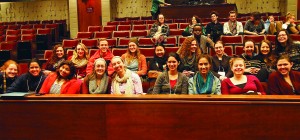Student participation in many chartered clubs and planned campus activities has decreased this year in comparison to past years. There are fewer chartered student organizations and others are lacking leadership. In addition, there is sparser event attendance than in the past, the SGA has down-sized, and Make a Difference Day participation dropped by half. Junior, Brittany Hark, observed it seems “20 percent of students are doing 80 percent of the work” on campus.
Last year there were upwards of 33 active clubs, and this year there are just a little over 16 under the Student Government Association (SGA), according to Jared Cram, executive officer of student life. Greg Bish, associate dean of student involvement and leaderships programs, sees the phasing out of some clubs as healthy as enrollment has declined.
 According to the Academic Records Office, in Fall 2011 Houghton College had 1095 enrolled students on campus. In Fall 2012 enrollment dropped to 999, then 947 in 2013, and now 932 as of Oct. 1 of this year.
According to the Academic Records Office, in Fall 2011 Houghton College had 1095 enrolled students on campus. In Fall 2012 enrollment dropped to 999, then 947 in 2013, and now 932 as of Oct. 1 of this year.
The Lanthorn editor, the campus’ literary magazine, up until last week was unfilled, despite funding and stipends available. In the past, the successors were usually brought up in the organization according to Bish, but this year that did not happen. Benjamin Murphy, last year’s Lanthorn co-editor and 2014 Houghton graduate, said the position was not well advertised at the end of last year because of the restructuring of the SGA. According to Ava Bergen, sophomore, few knew about the editor position at the end of last year or the beginning of this semester.
Bergen and Essie Fenstermacher, junior, have recently stepped up to the position to be co-editors. Laura Johnson, sophomore, Hope McKeever, junior, Sylvia and Emily Morrow, seniors, have also joined the cabinet.
Fenstermacher said she wanted to do it because she “would hate to see the Lanthorn cease to exist.” Bergen said “I think we assumed that someone else was taking the position because we didn’t hear anything about it.” When there was no sign of the Lanthorn the two contacted Bish for the position because they thought it is an important aspect of the Houghton community. Bergen said they will do their best to create a publication for this semester, “maybe not a large one, because of time restrictions.” Next semester they plan on producing two Candles, the smaller publications, plus the final release party of the Lanthorn at the end of the semester.
Concerning campus events, Bish said he does feel there is less student participation this year, compared to past years, even though there are roughly the same amount of events happening. As an example he pointed out at the question and answer with President Shirley Mullen on Oct. 30, there were only 16 students. Katherine Labrecque based on her observations and debriefing as student body president, agreed that student activity in planned campus events seems to have declined.
Make A Difference Day this year had only 200 participants compared to 450 last year and 350 the year before. Labrecque links this to several factors. She pointed out Make a Difference Day was right after midterms and October break. Additionally, first year students were not required by Transitions to participate. A good policy change said Labrecque, as she thought forced service was not a good idea. She also believes students did not want to take part in an all day event on a Saturday and suggested a new model of service. Bish also said five athletic teams were away that day, perhaps contributing to the decline.
Some organizations are doing better this year according to Cram and Bish. Journey’s End Tutoring (JET) has gone from one van of students to up to four this year. Bish pointed out this is perhaps a better way for students to serve as it is a weekly service, rather than a one time event.
Cram said he believes students have not noticed events by organizations so they are less likely to get involved with them. It is sort of a “vicious cycle” of an unawareness of opportunities that contributes to a lack of leaders, he said. If students do not notice what a club is doing, they are not going to join the club. Cram believes students feel less isolated if they are more involved. Bish said, “There are some pretty amazing things here that you [students] are missing out on… but you not going to be able to take advantage of them later.”
